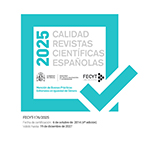Comportamientos fraudulentos entre el alumnado de grado en época de COVID-19
Resumen
La irrupción de la pandemia ha provocado que se instaure una enseñanza remota de emergencia y una evaluación remota de emergencia. Este nuevo contexto ha favorecido los comportamientos fraudulentos en el alumnado universitario. Estudiar este fenómeno y determinar los comportamientos más frecuentes es el objetivo del trabajo. En agosto de 2020 se envió un cuestionario sobre comportamientos poco éticos en la evaluación (trabajos y exámenes) dirigido a estudiantes de grado de la Facultad de Economía y Empresa de la Universidad de Zaragoza. Los análisis y pruebas para determinar la existencia de diferencias significativas se aplican a los 330 casos válidos. Como principal resultado destaca que son pocos los comportamientos poco éticos observados de forma habitual, pero los mismos se observan con una gran frecuencia. No colaborar de forma equitativa en la realización de trabajos en equipo, copiar el trabajo de otro estudiante y hacer trabajos deficientes son los comportamientos más habituales en cuanto a la elaboración de trabajos objeto de evaluación. Y con respecto a los observados durante los exámenes, siguen siendo los comportamientos fraudulentos clásicos: utilizar material no permitido (en sus dos variantes, la de papel y la más tecnológica), preguntar la respuesta y dejarse copiar en el examen. Destaca que la característica con la que se observan más diferencias es el sexo. Estos comportamientos poco éticos siguen instaurados en nuestro entorno educativo y las tecnologías de la información y comunicación lejos de limitarlos los favorecen. Dado que las instituciones universitarias no son solo responsables de formar profesionales con alto conocimiento y capacidades, sino también profesionales responsables y con integridad moral y ética, resulta fundamental plantearse posibles medidas formativas y correctoras para limitar estos comportamientos.
Descargas
Descarga artículo
Licencia
La Revista Complutense de Educación, para fomentar el intercambio global del conocimiento, facilita el acceso sin restricciones a sus contenidos desde el momento de su publicación en la presente edición electrónica, y por eso es una revista de acceso abierto. Los originales publicados en esta revista son propiedad de la Universidad Complutense de Madrid y es obligatorio citar su procedencia en cualquier reproducción total o parcial. Todos los contenidos se distribuyen bajo una licencia de uso y distribución Creative Commons Reconocimiento 4.0 (CC BY 4.0). Esta circunstancia ha de hacerse constar expresamente de esta forma cuando sea necesario. Puede consultar la versión informativa y el texto legal de la licencia.











